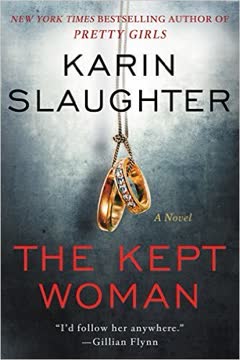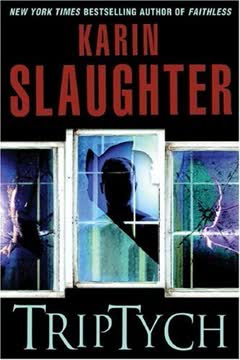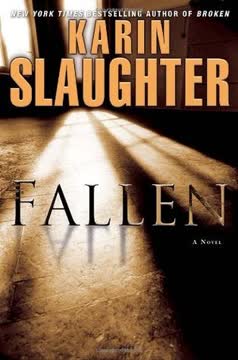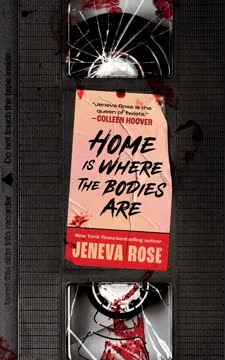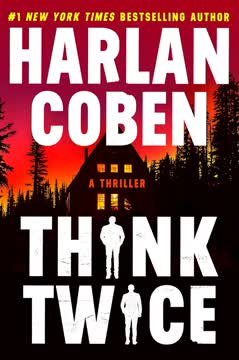Plot Summary
Blood on the Floor
A dead ex-cop, Dale Harding, is found in a pool of blood in an abandoned Atlanta nightclub owned by sports star Marcus Rippy. Special Agent Will Trent and his partner Faith Mitchell are called to the scene, which is awash in evidence: a doorknob jammed in Harding's neck, a woman's bloody footprints, and a missing tarp. The club's connection to Rippy, recently acquitted of rape, raises the stakes. Medical examiner Sara Linton quickly determines the blood isn't Harding's—someone else, likely a woman, was gravely wounded and has vanished. The urgency to find her before she dies sets the investigation in motion, while the personal and political implications for Will and Sara begin to surface.
The Missing Woman
The investigation pivots to the missing woman, whose blood and belongings are scattered through the club. The evidence points to a violent struggle, and the woman's injuries are life-threatening. As Will, Faith, and Sara race to identify her, the case becomes personal: the missing woman's gun is registered to Angie Polaski, Will's estranged wife. Sara's professional detachment is tested by her private pain, as Will's past with Angie threatens his relationship with Sara. The team splits up to chase leads, knowing every hour lost could mean the woman's death—and that the truth may be more complicated than it appears.
Past and Present Collide
Will's connection to Angie, and Sara's discovery of Angie's intrusion into her life, bring old wounds to the surface. Angie's history of abuse, manipulation, and survival is mirrored in the case's unfolding details. As the investigation deepens, the team uncovers ties between Harding, Angie, and the world of Atlanta's underbelly—prostitution, drugs, and dirty money. The lines between victim and perpetrator blur, and Will is forced to confront his own loyalties and failures. Sara, meanwhile, must decide how much of Will's past she can accept, as the search for the missing woman becomes a search for answers about themselves.
The Wife's Shadow
Angie's shadow looms over the investigation and Will's life. Evidence mounts that she was at the club, possibly as both victim and perpetrator. Sara and Faith uncover Angie's history of breaking into Will's home, stealing Sara's belongings, and leaving threatening notes. The emotional toll on Sara is immense, as she grapples with betrayal and the fear that Angie's manipulations will never end. Will, torn between guilt and anger, is desperate to find Angie—alive or dead. The case becomes a crucible for all three, testing the limits of love, trust, and forgiveness.
Secrets in the Attic
Faith and Collier search Harding's surprisingly upscale home, uncovering evidence of squalor, hoarding, and a locked closet that hints at darker secrets. They discover files on Delilah Palmer, a young woman with a long history of abuse, addiction, and exploitation—possibly Harding's daughter and wife. The house is a microcosm of Harding's corruption, and the presence of a pet rat and a bucket used for human waste add to the grotesque tableau. The team realizes that Harding's life and death are entwined with the fates of vulnerable women, and that the missing woman may be the key to unraveling the entire case.
The Web Tightens
As the investigation widens, the team uncovers a web of relationships linking Harding, Angie, Delilah, and the powerful men behind the All-Star Complex development. Angie's role as a fixer and her ties to Kip Kilpatrick, Rippy's manager, come to light. The team learns that Angie and Harding were both working for Kilpatrick, and that Delilah was being used as leverage in a high-stakes blackmail scheme. The lines between predator and prey blur further, as the team races to find Delilah and unravel the conspiracy before more lives are lost.
The Daughter's Legacy
Angie's past as a mother who abandoned her daughter, Jo (Josephine Figaroa), comes to the fore. Jo, now married to basketball player Reuben Figaroa, is trapped in an abusive marriage and becomes a pawn in the power games of men like Rippy and Kilpatrick. Angie's attempts to help Jo are complicated by her own history of violence and betrayal. The investigation reveals that Jo possesses a video that could destroy Rippy and Figaroa, making her a target. The cycle of abuse passes from mother to daughter, with devastating consequences.
The Body in the Trunk
Angie's car is found at a funeral home, its trunk stained with blood. The team fears the worst: that Angie is dead. But the body in the funeral home, mutilated to prevent identification, is not what it seems. Through forensic analysis, Sara and Gary determine that the body is not Angie's, but Delilah Palmer's. Angie has staged the scene to fake her own death, buying time for a new scheme. The revelation upends the investigation, forcing the team to reconsider every assumption and redouble their efforts to find the missing child, Anthony.
The Funeral Home Revelation
The discovery at the funeral home leads to a cascade of revelations. Angie's manipulation of evidence, her use of Delilah's body, and her ongoing attempts to control the narrative become clear. Will receives a taunting phone call from Angie, who reveals that Jo is her daughter—and that Jo is dead. The emotional impact on Will is profound, as he confronts the possibility that he fathered a child with Angie, only to lose her to violence. The team realizes that Angie's endgame involves Anthony, Jo's son, who is now missing and in grave danger.
The Ransom Game
Angie's plan to ransom Anthony for a video that could destroy Rippy and Figaroa spirals out of control. Virginia Souza, Harding's old accomplice, has taken Anthony and is demanding the video in exchange for his life. Reuben Figaroa, desperate and armed, prepares for a public showdown. The team scrambles to intercept the exchange at a crowded mall, knowing that one wrong move could end in tragedy. The tension is unbearable as law enforcement, criminals, and innocents converge in a final, deadly game.
The Final Confrontation
The handoff at the mall explodes into violence. Reuben kills Souza and her accomplice, then takes Anthony hostage, threatening to kill his own son rather than lose control. Will, Faith, and Amanda risk everything to save Anthony, navigating a maze of hostages, gunfire, and split-second decisions. In the end, Will's intervention saves Anthony, but Reuben, unable to face the loss of power and family, kills himself. The cost of survival is high, and the survivors are left to reckon with the trauma and loss.
Aftermath and Reckoning
In the wake of the violence, the team pieces together the full extent of Angie's manipulations, Harding's crimes, and the suffering of Jo and Anthony. The All-Star Complex collapses under the weight of scandal, and the video of Rippy and Figaroa's crimes goes public, destroying reputations and careers. Angie escapes justice once again, leaving behind a trail of broken lives. Will and Sara struggle to rebuild their relationship, haunted by the ghosts of the past and the knowledge that some wounds may never heal.
The Price of Survival
Jo and Anthony begin new lives, scarred but free from their abusers. Angie, ever the survivor, disappears into the shadows, watching from afar as her daughter and grandson try to find happiness. Will and Sara confront the limits of forgiveness and the cost of loving someone with a damaged past. The team reflects on the nature of evil, the resilience of victims, and the ways in which trauma echoes through generations. The price of survival is steep, and not everyone can pay it.
Love, Loss, and Letting Go
Will and Sara, battered by the events of the case, must decide whether their love can withstand the weight of the past. Will's struggle to let go of Angie and embrace a future with Sara is mirrored by Sara's own fears of being second best. Through honesty, vulnerability, and the willingness to confront their pain, they find a path forward. The lesson is clear: love is not about erasing the past, but about choosing to build something new in its wake.
Epilogue: Watching from Afar
Months later, Angie sits in a park, watching Jo and Anthony from a distance. She reflects on the choices that led her here, the damage she caused, and the hope that her daughter and grandson might find happiness. Angie knows she can never be part of their lives, but she takes solace in their survival. The cycle of abuse may be broken, but the scars remain. The story ends not with justice, but with the bittersweet knowledge that survival is its own kind of victory.
Characters
Will Trent
Will is a Special Agent with the GBI, defined by his traumatic childhood in foster care, his dyslexia, and his deep need for connection. His marriage to Angie Polaski is a source of lifelong pain and confusion, as she oscillates between victim and abuser. Will's relationship with Sara Linton offers hope and healing, but is constantly threatened by Angie's manipulations and his own inability to let go of the past. Will is driven by a fierce sense of justice, but his personal entanglements cloud his judgment. Over the course of the story, he is forced to confront the limits of his loyalty, the cost of survival, and the possibility of forgiveness.
Sara Linton
Sara is the GBI's medical examiner, a brilliant doctor with a tragic past. Her love for Will is tested by Angie's presence and the secrets Will keeps. Sara is both strong and vulnerable, capable of great empathy but also deeply wounded by betrayal. Her professional detachment is challenged by the personal stakes of the case, and she must decide how much of Will's past she can accept. Sara's journey is one of self-discovery, as she learns to balance love, trust, and the need to protect herself from further harm.
Angie Polaski
Angie is Will's estranged wife, a woman shaped by abuse, abandonment, and a lifetime of running. She is both victim and perpetrator, capable of great cruelty and desperate acts of love. Angie's relationship with Will is toxic but inescapable, and her attempts to help her daughter Jo are complicated by her own history of violence and betrayal. Angie is a master manipulator, staging her own death, orchestrating blackmail, and always staying one step ahead of the law. Her psychological complexity is the engine of the novel, driving the plot and tormenting everyone around her.
Faith Mitchell
Faith is Will's partner at the GBI, a single mother and seasoned investigator. She provides stability and perspective, often serving as the emotional anchor for Will and Sara. Faith's own experiences with motherhood, loss, and the challenges of law enforcement inform her approach to the case. She is pragmatic, loyal, and unafraid to call out the truth, even when it hurts. Faith's development is marked by her growing understanding of trauma and her commitment to justice for the most vulnerable.
Dale Harding
Harding is a retired detective whose life is a catalogue of vice: gambling, hoarding, and the exploitation of women and children. His relationship with Delilah Palmer, both daughter and wife, is emblematic of his depravity. Harding's death is the catalyst for the novel's events, and his legacy of abuse reverberates through every character. He is both a victim of his own self-destruction and a perpetrator of unimaginable harm. Harding's psychological profile is one of narcissism, entitlement, and a desperate need for control.
Delilah Palmer
Delilah is Harding's daughter and wife, a young woman whose life has been defined by exploitation, addiction, and abandonment. She is both a victim and a survivor, used as leverage in schemes she barely understands. Delilah's fate is a testament to the generational cycle of abuse, and her death is both a tragedy and a turning point in the story. Her psychological makeup is marked by learned helplessness, a desperate need for love, and the inability to escape the forces that control her.
Josephine (Jo) Figaroa
Jo is the daughter Angie abandoned at birth, now married to Reuben Figaroa and mother to Anthony. Her life is a prison of domestic abuse, surveillance, and fear. Jo's possession of the incriminating video makes her a target, and her attempts to escape are fraught with danger. She is both strong and fragile, shaped by the legacy of her mother's choices and her own struggle for survival. Jo's psychological journey is one of awakening, as she fights to break free from the cycle of abuse and protect her son.
Reuben Figaroa
Reuben is a professional basketball player, Jo's husband, and Anthony's father. His public persona is at odds with his private brutality. Reuben's need for control, his violence, and his eventual unraveling are central to the novel's climax. He is both a product of toxic masculinity and a cautionary tale about the corrosive effects of power. Reuben's psychological profile is marked by narcissism, paranoia, and a capacity for both love and destruction.
Kip Kilpatrick
Kilpatrick is Marcus Rippy's manager and the architect of many of the novel's schemes. He is a fixer, a man who thrives in the shadows, orchestrating cover-ups, payoffs, and violence to protect his clients. Kilpatrick's relationship with Angie, Harding, and the other players is transactional and ruthless. His eventual downfall is a testament to the limits of power and the inevitability of justice. Psychologically, Kilpatrick is a sociopath, driven by greed and a belief in his own invincibility.
Anthony Figaroa
Anthony is Jo and Reuben's six-year-old son, the unwitting center of the novel's final act. His abduction and rescue are the emotional climax of the story, representing both the vulnerability of the innocent and the possibility of breaking the cycle of abuse. Anthony's psychological development is shaped by trauma, but his survival offers a glimmer of hope for the future.
Plot Devices
Dual Timelines and Shifting Perspectives
The novel employs a dual timeline structure, alternating between the present-day investigation and flashbacks to the events leading up to the murder. This device allows the reader to piece together the mystery alongside the characters, gradually revealing the connections between past trauma and present violence. Shifting perspectives—primarily between Will, Sara, Faith, and Angie—provide insight into each character's motivations and psychological state, heightening the emotional stakes and complicating the search for truth.
Red Herrings and Misdirection
Slaughter uses red herrings and deliberate misdirection to maintain suspense. The initial assumption that Angie is dead, the staged crime scene, and the misidentification of bodies all serve to keep both the characters and the reader off-balance. The true nature of the relationships between Harding, Angie, Delilah, and Jo is revealed only gradually, as is the ultimate goal of the blackmail scheme. This device mirrors the confusion and uncertainty experienced by trauma survivors, reinforcing the novel's psychological themes.
Symbolism of Blood and Survival
Blood is a recurring symbol, representing both physical violence and the ties that bind (and destroy) families. The literal blood on the floor, the shared blood types, and the wounds inflicted on bodies all echo the emotional scars carried by the characters. Survival—at any cost—is another central motif, embodied by Angie's relentless drive, Jo's attempts to escape, and Will and Sara's struggle to build a life together. The novel interrogates what it means to survive, and whether survival is enough.
The Unreliable Narrator
Angie, in particular, serves as an unreliable narrator, manipulating evidence, staging scenes, and controlling the flow of information. Her perspective is both seductive and suspect, forcing the reader to question what is real and what is performance. This device underscores the novel's exploration of trauma, memory, and the difficulty of discerning truth in a world shaped by abuse and deception.
The Cycle of Abuse
The novel's structure and character arcs are built around the cycle of abuse, both literal and metaphorical. The sins of the parents are visited upon the children, and the struggle to break free from this cycle is the engine of the story. The plot's resolution hinges not on the triumph of justice, but on the possibility of healing and the recognition that survival, while imperfect, is a victory in itself.
Analysis
Karin Slaughter's The Kept Woman is a masterful exploration of trauma, survival, and the corrosive effects of secrecy and abuse. Through a labyrinthine plot and deeply flawed, psychologically rich characters, the novel interrogates the ways in which violence—both physical and emotional—echoes through generations. The story's structure, with its shifting timelines and perspectives, mirrors the confusion and fragmentation experienced by survivors of trauma. Slaughter refuses easy answers: justice is partial, survival comes at a cost, and the wounds of the past are never fully healed. The novel's central lesson is that love and survival are not about erasing pain, but about choosing to move forward in spite of it. The characters' struggles—with loyalty, forgiveness, and the search for meaning—resonate in a world where the lines between victim and perpetrator are often blurred. Ultimately, The Kept Woman is a testament to the resilience of the human spirit, the complexity of love, and the enduring hope that, even in the darkest circumstances, healing is possible.
Last updated:
Review Summary
The Kept Woman is the eighth book in the Will Trent series, featuring complex characters and a gripping murder mystery. Readers praise Slaughter's writing style, character development, and ability to keep them guessing. The story focuses on Will's troubled relationship with his estranged wife Angie, who many readers despise yet find fascinating. While some found the book intense and riveting, others felt it dragged in parts. Overall, fans of the series appreciate the deeper exploration of Will and Angie's past.
